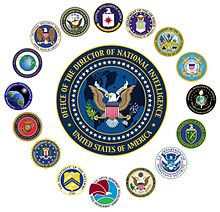United States Intelligence Community
Intelligence is a broad term that may entail for example: Collection, analysis, and production of sensitive information to support national security leaders, including policymakers, military commanders, and members of Congress.The IC strives to provide valuable insight on important issues by gathering raw intelligence, analyzing that data in context, and producing timely and relevant products for customers at all levels of national security—from the war-fighter on the ground to the president in Washington.[7]Executive Order 12333 charged the IC with six primary objectives:[8] Before the CIA's establishment, several military intelligence agencies,[9] and the FBI to a limited extent, fulfilled its role.The total budget of the National Intelligence Program has been public since 2007, due to the Implementing Recommendations of the 9/11 Commission Act of 2007, which required them to disclose the "aggregate amount of funds appropriated by Congress” for the NIP within 30 days of the end of the fiscal year.The requested budget of the NIP has been public since 2011 due to a requirement enacted by Congress in Section 364 of the Intelligence Authorization Act for Fiscal Year 2010.It includes salaries for about 100,000 people, multi billion-dollar satellite programs, aircraft, weapons, electronic sensors, intelligence analysis, spies, computers, and software.Steven Aftergood of the Federation of American Scientists, which provides analyses of national security issues, stated that "It was a titanic struggle just to get the top-line budget number disclosed, and that has only been done consistently since 2007 ... but a real grasp of the structure and operations of the intelligence bureaucracy has been totally beyond public reach.


Stacey DixonDirector of National IntelligenceU.S. federal governmentintelligence activitiesforeign policynational securityintelligence agenciesmilitary intelligencefederal executive departmentsOffice of the Director of National Intelligencepresident of the United StatesExecutive Order 12333Ronald ReaganThe Washington Postcounterterrorismhomeland securityWalter Bedell SmithDirector of Central IntelligenceNational Security Councilsecretary of statesecretary of defenseexecutive branch officialsinformationterroristnarcoticsU.S. foreign policypublic opiniondiplomatic activitiesOffice of Naval IntelligenceU.S. NavyDefenseCoast Guard IntelligenceU.S. Coast GuardBureau of Intelligence and ResearchUnited States Department of StateCentral Intelligence AgencyExecutive Office of the President of the United StatesIndependent agencyNational Air and Space Intelligence CenterU.S. Air ForceNational Security AgencyCentral Security ServiceDepartment of DefenseNational Reconnaissance OfficeDefense Intelligence AgencyU.S. Army IntelligenceU.S. ArmyOffice of Intelligence and CounterintelligenceDepartment of EnergyEnergyMarine Corps Intelligence, Surveillance, and Reconnaissance EnterpriseU.S. Marine CorpsNational Geospatial-Intelligence AgencyOffice of Intelligence and AnalysisDepartment of the TreasuryTreasuryIntelligence BranchFederal Bureau of InvestigationJusticeOffice of National Security IntelligenceDrug Enforcement AdministrationDepartment of Homeland SecurityNational Space Intelligence CenterU.S. Space ForceArmy Intelligence and Security CommandNavy Fleet Cyber CommandSixteenth Air ForceNational Security Act of 1947Executive OrderIntelligence Reform and Terrorism Prevention Actfederationconfederationdirector of the Central Intelligence Agency9/11 CommissionWMD CommissionIntellipediaNational Intelligence CentersProgram Manager Information Sharing EnvironmentInformation Sharing CouncilIntelligence Reform and Terrorism Prevention Act of 2004Executive Order 13388National Intelligence StrategyUnited States intelligence budgetImplementing Recommendations of the 9/11 Commission Act of 2007contractorsprocurementinflationCenter for Strategic and Budgetary AssessmentsdeclassifiedMike McConnellclassified budget informationsalariessatellite programsaircraftweaponsintelligence analysiscomputerssoftwareFederation of American ScientistsIntelligence Community OversightPresident's Foreign Intelligence Advisory BoardJoint Intelligence Community CouncilOffice of the Inspector GeneralOffice of Management and Budgetcongressional oversightcommitteesUnited States House Permanent Select Committee on IntelligenceUnited States Senate Select Committee on IntelligenceHouse Armed Services CommitteeSenate Armed Services CommitteeSenate appropriations committeesSenate Committee on Homeland Security and Governmental Affairs108th CongressUKUSA AgreementFive EyesUnited Kingdom Intelligence CommunityNew Zealand intelligence agenciesIntelligence services in CanadaAustralian Intelligence CommunityList of intelligence agenciesTop Secret AmericaUnited States National Security CouncilWorld Basic Information LibraryReserve Componentopen-source intelligenceWayback Machine